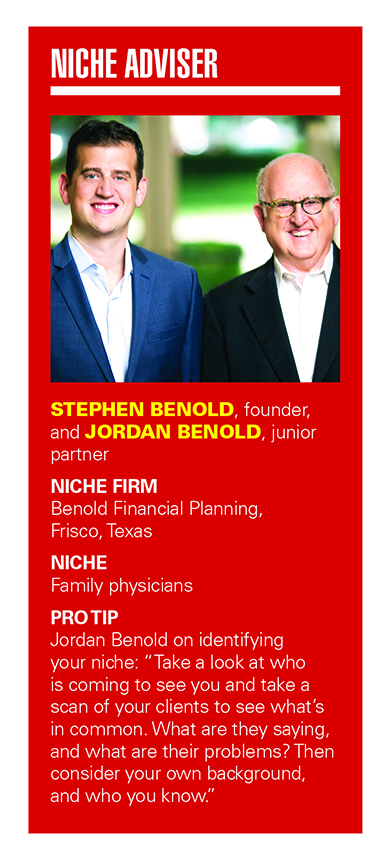

Stephen Benold didn’t specifically plan to develop a niche financial planning practice, but as a medical doctor transitioning into wealth management, the niche of family physicians just fell into place.
Benold, 72, founded Benold Financial Planning in Frisco, Texas, just north of Dallas, in 2005 after spending 25 years working as a family physician.
Although he maintains his medical license to help care for kids at a nearby juvenile detention facility, Benold said his migration toward financial planning was part of his plan to lighten his overall workload.

“I spent 25 years as a doctor and I was getting to the point where I didn’t want to work that hard anymore,” he said. “I was really busy, and I wanted to keep working but didn’t want to work that hard.”
Appreciating the time and energy it takes to work as a family physician is a large part of how Benold developed his niche, along with the fact that he built his practice doing what any savvy entrepreneur would do: He went to his existing network of connections and colleagues looking for clients.
A past president of the Texas Academy of Family Physicians, Benold rents a booth at events and presents about economic issues at meetings.
“It did not start as a niche; it just happened and came about through my connection to organized medicine,” he said. “A doctor that was my intern when I was a resident was very active in the state organization, and he asked me to help him [with some financial planning issues]. He was so pleased he referred me to other doctors. I realized that was going to be a way to get clients.”
Almost half of Benold’s clients are family physicians, but that effort is ramping up and the niche is likely to start narrowing now that his son, Jordan Benold, is on board.
Jordan, 40, joined the $96 million advisory firm two years ago when his dad started talking about a succession plan for the business.
After spending 16 years working in the mortgage industry, Jordan went back to school to earn his MBA and his CFP designation.
Although Jordan admits to not having the same level of understanding of what it takes to be a family physician, he has grown up around the medical field. In addition to his father, both his grandfathers were doctors, and his uncle is a doctor.
“I see the stresses put on physicians and the time they don’t have to focus on and work out their money issues,” Jordan said. “I compare it to mowing your own lawn. These are smart people, and they could go and look up everything, but they don’t have the time to do it.”
While there is no specific timeline for when the business will transition from father to son, the influence of the next generation is already taking shape.
In addition to efforts like tailoring the website to highlight the family physician niche, Jordan talks like someone who understands the opportunity in front of him.
“When I first came on, I knew about the need to have a niche market,” he said. “We do have a niche, but when you look at our website, we don’t have a blog or anything and we’re not really targeting them.”
Since 2005, the advisory firm has grown almost exclusively through referrals, which still includes keeping the doors open to clients who are not medical doctors.
Industry consultants typically advise making a niche as narrow as possible and even turning away clients who don’t fit the profile.
“I keep hearing that you should niche down even further,” Jordan said. “My dad built this business with pen and paper, but now we want to market more toward where people are sitting on the web and social media.”
Most of the family physician clients are in their 60s, but Jordan also plans to start focusing on attracting younger doctors who are still dealing with student loan debt and other financial challenges.
“Just because they have a big salary doesn’t mean they have big wealth,” he said. “Most of the clients that pick us are not high rollers or big spenders, and they aren’t going to be the ones who want to put all their money in Bitcoin. But their bank accounts swell quickly, and they don’t want it sitting there earning nothing.”

Relationships are key to our business but advisors are often slow to engage in specific activities designed to foster them.

Whichever path you go down, act now while you're still in control.

Pro-bitcoin professionals, however, say the cryptocurrency has ushered in change.

“LPL has evolved significantly over the last decade and still wants to scale up,” says one industry executive.

Survey findings from the Nationwide Retirement Institute offers pearls of planning wisdom from 60- to 65-year-olds, as well as insights into concerns.
Streamline your outreach with Aidentified's AI-driven solutions
This season’s market volatility: Positioning for rate relief, income growth and the AI rebound
